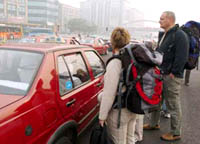
Two foreigners were waiting taxi on a roadside in front of Beijing railway station on January 7. They has been refused by several cab drivers for their destination was near.
Beijing's stretching streets and seemingly boundless boulevards are, even in the best of times, jam-packed with all kinds of vehicles. Perhaps most notable are the fleets of dark red taxis, which cover every corner of the capital. And with the 2008 Olympic Games on the horizon, Beijing is planning to upgrade its taxis – but at a cost. Many are complaining that the upgrade is causing huge inconveniences, as it is now more difficult to hail a cab. Why is this happening?
Beijing's stretching streets and seemingly boundless boulevards are, even in the best of times, jam-packed with all kinds of vehicles. Perhaps most notable are the fleets of dark red taxis, which cover every corner of the capital. And with the 2008 Olympic Games on the horizon, Beijing is planning to upgrade its taxis—but at a cost. Many are complaining that the upgrade is causing huge inconveniences, as it is now more difficult to hail a cab. Why is this happening?
Many are now familiar with this scenario: freezing cold wind piercing the very core of your being as you stand, hopeless AND frozen, waiting for a taxi. And while playing this waiting game most realize that it now takes longer than it used to for a taxi to come along. Ma, a veteran Beijing taxi driver explains: "There are less taxis running in the city recently. Especially the Xiali car. Many of them have or will soon be deposed."
Ma is driving a Xiali, which have the lowest fares, 1.2 yuan for every kilometer. His car will also be taken out of service at the end of month. Still, recent statistics have shown that there are more than 60,000 taxis in Beijing. Most of them are Xialis, Citroen Fukangs, or Volkswagen Jettas with fares ranging from 1.2 yuan to 2 yuan per kilometer.
Talking about changing to a new car, Ma said he is not sure about it. Though the government is planning to upgrade the taxis in the city, it has not yet given a final standard.
Back in 2002, the city communication authorities set about improving the standards of models used for taxis to improve services for tourists and improve the city's image as Beijing prepares for the Olympic Games in 2008.
The Sonata, a model manufactured by the Beijing Hyundai Automobile Co, was said to be the first choice of the municipal government at that time.
The news aroused heated debate. After all, many automakers from home and abroad are drooling over the city's taxi market, which boasts 64,000 cabs with a renewal rate of 20-30 per cent annually.
The communications commission explained later that it was working to draw up a new standard for the models used for taxis, and any car model from any automobile maker has the opportunity to enter the taxi market if it meets government standards.
Two years later, the standard has yet been made public. Car companies are therefore afraid to have a hasty buy.
Ma said the much-whispered about possible standard is that the length of the car should not be less than 4.5 metres and should be powered by nothing less than a 1.6 liter engine.
"Fukang taxis use a 1.4 liter engine car. If it is true that only 1.6 liter and above is allowed, the Xiali and Citroen Fukang models, which dominate the taxi market at present, would be gradually phased out."
But Ma says though there will be fewer cars running on the road in the next few months, it won't be long until more cars are on the road. He says his company has booked some models with 1.6 liter engines.
What Ma is most concerned about is the price after changing to a new model. Better cars mean higher prices. He gives his opinion.
"1.6 yuan for 1.6 liter engine car will be a reasonable price. Petrol prices and maintenance are also important."
Ma thinks the price is also acceptable for taxi takers since the going rate for Fukang care is currently 1.6 yuan. Although no cheaper Xiali cars are available in the future, people can enjoy more comfortable and better service taxis.
(China.org.cn CRI.com January 14, 2005)
|

